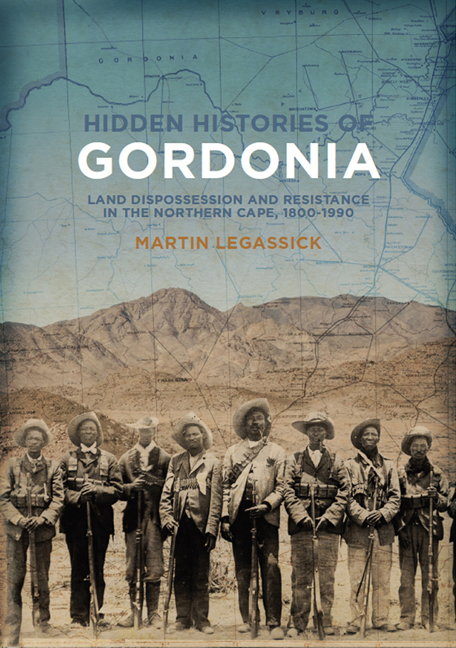Book contents
- Frontmatter
- Dedication
- Contents
- Acknowledgements
- Acronyms and abbreviations
- Illustrations
- Preface
- Chapter 1 The prehistory of Gordonia
- Chapter 2 The Baster settlement of Gordonia and its decline
- Chapter 3 The will of Abraham and Elizabeth September: a struggle for land in Gordonia, 1898–2014
- Chapter 4 From prisoners to exhibits: representations of Bushmen of the northern Cape, 1880–1900
- Chapter 5 South African human remains and the politics of repatriation: reconsidering the legacy of Rudolf Pöch
- Chapter 6 The early history of the brown Afrikaners in Riemvasmaak
- Chapter 7 The battle of Naroegas
- Chapter 8 The Marengo rebellion and Riemvasmaak, 1903–1907
- Chapter 9 The racial division of Gordonia, 1921–1930
- Chapter 10 Keidebees and Blikkies locations, Upington, 1894–1974
- Chapter 11 ‘All my powers have been swallowed by Upington’: the life and times of Alfred Gubula
- References
- Index
Chapter 1 - The prehistory of Gordonia
Published online by Cambridge University Press: 20 April 2018
- Frontmatter
- Dedication
- Contents
- Acknowledgements
- Acronyms and abbreviations
- Illustrations
- Preface
- Chapter 1 The prehistory of Gordonia
- Chapter 2 The Baster settlement of Gordonia and its decline
- Chapter 3 The will of Abraham and Elizabeth September: a struggle for land in Gordonia, 1898–2014
- Chapter 4 From prisoners to exhibits: representations of Bushmen of the northern Cape, 1880–1900
- Chapter 5 South African human remains and the politics of repatriation: reconsidering the legacy of Rudolf Pöch
- Chapter 6 The early history of the brown Afrikaners in Riemvasmaak
- Chapter 7 The battle of Naroegas
- Chapter 8 The Marengo rebellion and Riemvasmaak, 1903–1907
- Chapter 9 The racial division of Gordonia, 1921–1930
- Chapter 10 Keidebees and Blikkies locations, Upington, 1894–1974
- Chapter 11 ‘All my powers have been swallowed by Upington’: the life and times of Alfred Gubula
- References
- Index
Summary
The Orange River valley must have acted as a magnet, drawing people to its banks from the earliest times. Its first occupants were hunter-gatherers (presumably ancestors of the Bushmen), who were supplemented from about 500 AD by (Khoi) pastoralists who dispersed east and west along the Orange River – from where many migrated to what are now the Western and Eastern Cape provinces some five hundred years later. Those pastoralists that remained along the Orange included those becoming Nama (on the lower reaches towards the coast – where the Great Nama eventually turned north and the Little Nama south) and those becoming Einiqua (on the middle reaches around the later settlement of Upington). In the late 18th century, at least, 100 kilometres of river upstream from the later settlement of Pella, land inhabited only by Bushmen, separated Nama from Einiqua. To the north-east of these middle reaches, towards the better watered Highveld, could be found Sotho-Tswana peoples. Southernmost among them was the Barolong kingdom which grew strong after 1600, trading as far as Delagoa Bay. Skeletal remains of graves on the Orange River show ‘evidence of gene flows between local Khoesan and the neighbouring black African peoples… a dynamic population trading and mixing generally with the Tswana peoples beyond the Orange River’.
Around the 1690s some of the Khoi who had gone to the western Cape region (the ‘Great Korana’), now called the Gorachoqua, returned to the Orange as the Left-Hand Korana, and, it is said, destroyed the cordiality which had existed between the Orange River Khoi and the Bushmen. In a series of wars they established themselves eastward up to the surrounds of the present-day Kimberley. Fifty years later other Gorachoqua, who became known as the Right-Hand Korana or Kora, led by the Taaibosch chiefdom, also returned to the Orange (via an intermediate period of settlement in the Sneeuwberg) and settled at the later Griquatown, provoking the wrath of the Barolong king Tau. They brought with them trade links with the western Cape.
With the return of these Korana from the western Cape, some of the Orange River Khoi of the eastern and the middle river became intermingled with or renamed themselves ‘Korana’, also known as ‘Little Korana’.
- Type
- Chapter
- Information
- Hidden Histories of GordoniaLand dispossession and resistance in the Northern Cape, 1800–1990, pp. 1 - 30Publisher: Wits University PressPrint publication year: 2016



